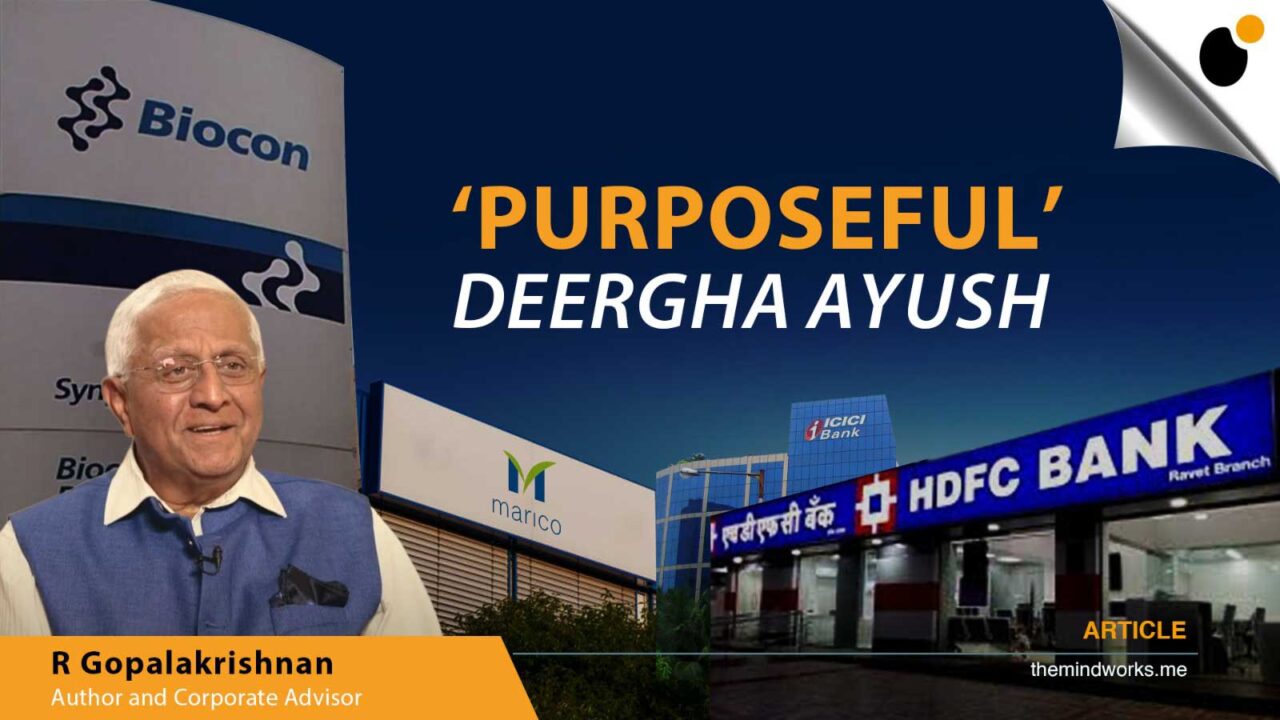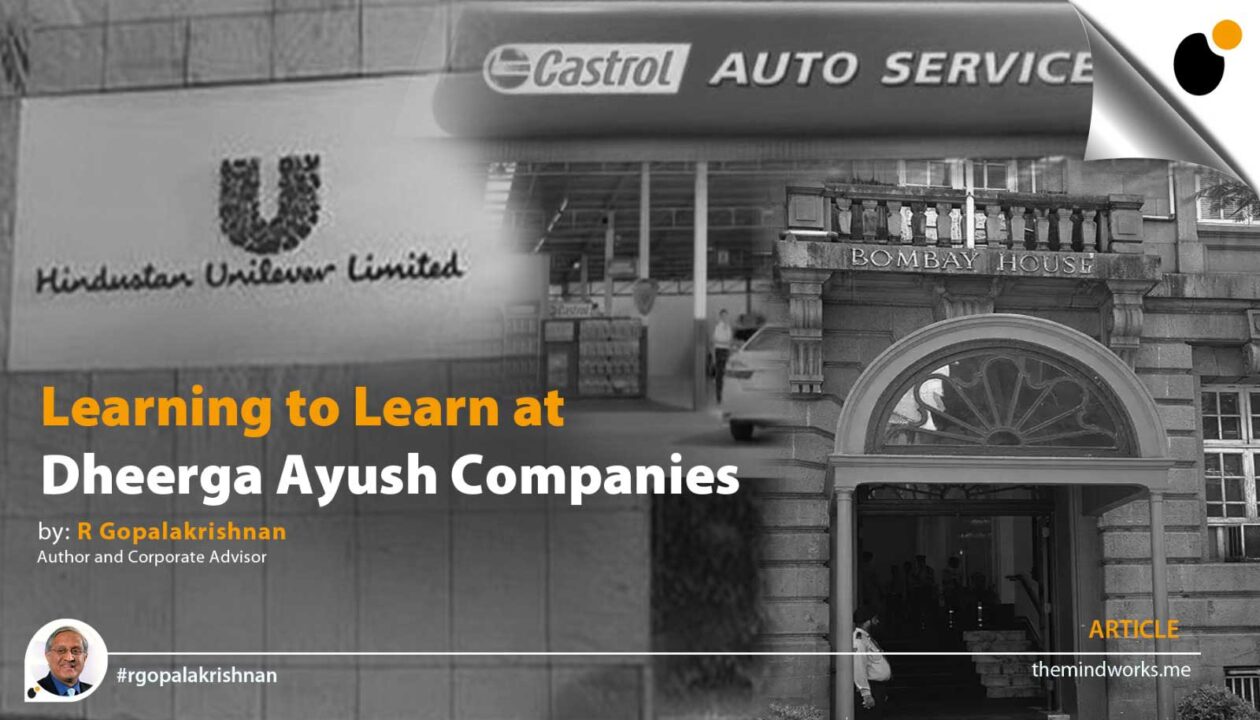BS The Wise Leader (48)
To appear 12-1-22
Can a professional CEO be entrepreneurial? And the converse?
By R. Gopalakrishnan*
(rgopal@themindworks.me)
(The writer is a bestselling author and corporate advisor. His latest book, “Pivots for career success: unleashing people power,” has just been published by Rupa. He was Director, Tata Sons and Vice Chairman, Hindustan Unilever during his career.)
India Inc needs many more entrepreneurial and professional CEOs. It is not a ‘this or that’ framework.
Legend has it that choosing the right CEO counts among the board’s most critical roles. Succession planning is a subject that is forever in the air—at startups, family businesses, PSUs, and at some of India’s biggest listed companies. There are those who favor ‘promoter-CEO’ appointments; equally, there are those who subscribe to ‘professional-CEO’ narratives. Both are deficient because they are slaves to a single narrative. Questions that arise are complex and intertwined:
- Who is better as a CEO, a family member or a professional?
- Are family members and professionals different?
- Should an internal candidate take the top job?
- When is it better to explore outside candidates?
- With a professional CEO at the helm, who will be in charge—majority shareholder or the CEO?
- Can the majority shareholder exercise influence and control after yielding autonomy to the CEO?
These are some of the questions that boards wrestle with. In this article, I propose to explore the nuances of a promoter CEO and a professional CEO.
Many founders and families believe that professionals lack skin in the game, and, therefore, don’t have the stomach to take long-term bets. They believe that professionals take a Q-Q view, whereas founders and families take big bets. This is partial truth.
As opposed to this narrative, many professionals believe that founders and families don’t adequately respect process and governance norms; that they are more motivated by personal gain for themselves. This is also a partial truth.
With such a mental demarcation, boards get one or the other because, in their minds, the circles representing promoter and professional CEO have no overlap. This is not a correct mental model.
I can think of promoter family members who are solidly professional in terms of their education, career, and management approach. Mukesh Ambani is both—as solidly entrepreneurial as professional. So also with Rajiv Bajaj, Rishad Premji, and Pavan Munjal. Further, there are promoters who have made explicit that their successor is either already from outside the family or will not be one necessarily in the future—for example, Anand Mahindra at M&M, Harsh Mariwala at Marico, and Uday Kotak at Kotak Mahindra Bank.
Conversely, there are professionals who are very entrepreneurial and take long-term bets. Think of Dr. DV Kapur at NTPC, or V Krishnamurthy at BHEL amongst PSUs as examples. Recall Darbari Seth of Tata Chemicals or Sumant Moolgaokar at Telco. Consider Anil Naik at L&T, who mounted an entrepreneurial defense of L&T when a takeover was attempted; through his Project Lakshya, Naik decoded the levers of change required to improve his company’s market value. Recall the spirited defense of Hindustan Lever, with a clear eye on the long-term, by T. Thomas and Ashok Ganguly, to retain Unilever shareholding, and diversifying into nationally desired sectors like fine chemicals, fertilizers, and exports. Consider Ajit Narayan Haksar, who as early as the 1970s, diversified ITC into hotels, paper, and agribusiness, with his eye on reducing the company’s dependence on tobacco. His successors, J.N. Sapru and K.L. Chugh, continued to develop an entrepreneurial, professional culture. Even Yogi Deveshwar began his term similarly, but, according to some, he became more promoter than professional in the later part of his term.
Thus, India Inc has experience of entrepreneurial, management professionals—not common, but known to perform well. Any of the names mentioned above belongs right there, irrespective of origins as a professional or promoter. The truth is that India Inc needs many more entrepreneurial, professional CEOs. It is not a ‘this or that’ framework.
Some commentators on India Inc seem to be obsessed with the idea of ‘control.’ Control of the affairs of the company? It is the executive management and the board that is in control. It is neither the CEO nor the majority shareholder, though, undoubtedly, they have considerable influence.
Of the 6,000 listed companies in the stock exchange, ten companies account for 90% of the profits. The top companies by market capitalization are all led by entrepreneurial, professional CEOs—Reliance, TCS, HDFC Bank, Infosys, HUL, ICICI Bank, HDFC Ltd, Bajaj Finance, SBI, Bharti Airtel, Wipro, Kotak Mahindra Bank, HCL Technologies, Asian Paints. Not one of them has a “stodgy, resistant-to-change professional” as the image of the professional is thought to be; equally, none has the “fanciful, buccaneer entrepreneur.” On the flip side, review the top NPA companies in 2020—Gitanjali Gems, Kingfisher Airlines, ABG Shipyard, Rei Agro, Winsome Diamonds—all strongly promoter-led.
In future columns, I hope to touch upon the making of the entrepreneurial professional leader—based on my experiences at Unilever and Tata, as also as an independent director of several listed companies in India and abroad.



